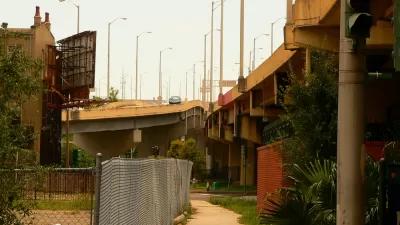The recently passed infrastructure bill dedicates $1 billion to freeway removal and capping, but the sum is only a 'first step' toward redressing the injustices perpetuated by urban highway projects.

Wyatt Gordon describes the Biden administration's push to use newly available infrastructure funds to rectify some of the injustices wrought by urban renewal policies and the interstate highway system that have ravaged neighborhoods and destroyed homes, businesses, and livelihoods over the last half century.
According to Transportation Secretary Pete Buttigieg, "Twenty-first century planning has to be about how any new transportation asset is integrating the surrounding areas. How do we knit it all together in a way that benefits all?" The new infrastructure bill allocates $1 billion to freeway removal and capping projects, which could prove 'transformational' if distributed effectively.
With $1.2 trillion in new spending in the bipartisan infrastructure bill on everything from Amtrak and public transit to bridge repairs and road expansions, ensuring equitable engagement surrounding such huge investments will be no easy feat.
The $1 billion dedicated to freeway removal could be a drop in the bucket compared to the nation's needs. According to Gordon, "Tearing out an expressway which decimated the Tremé neighborhood of New Orleans has been estimated to cost $500 million alone." But Buttigieg characterizes that initial spending as a "first step" towards restoring and reconnecting communities.
As awareness of the damaging impacts of urban freeways grows, highway removal is quickly gaining traction as an important tool for fighting injustice, improving neighborhood connectivity, and providing economic opportunities in underserved areas. While local leaders frequently oppose freeway construction projects—see Houston's beleaguered Interstate 45 expansion as an example—federal agencies have been slow to change decades-old policies that hinder highway removal. Advocates say state and federal DOTs should rethink their 'throughput at all costs' mentality in favor of creating streets that are safe and economically vibrant.
FULL STORY: Could Biden’s Infrastructure Bill Help Heal the Scars Highways Created?

Planetizen Federal Action Tracker
A weekly monitor of how Trump’s orders and actions are impacting planners and planning in America.

Chicago’s Ghost Rails
Just beneath the surface of the modern city lie the remnants of its expansive early 20th-century streetcar system.

San Antonio and Austin are Fusing Into one Massive Megaregion
The region spanning the two central Texas cities is growing fast, posing challenges for local infrastructure and water supplies.

Since Zion's Shuttles Went Electric “The Smog is Gone”
Visitors to Zion National Park can enjoy the canyon via the nation’s first fully electric park shuttle system.

Trump Distributing DOT Safety Funds at 1/10 Rate of Biden
Funds for Safe Streets and other transportation safety and equity programs are being held up by administrative reviews and conflicts with the Trump administration’s priorities.

German Cities Subsidize Taxis for Women Amid Wave of Violence
Free or low-cost taxi rides can help women navigate cities more safely, but critics say the programs don't address the root causes of violence against women.
Urban Design for Planners 1: Software Tools
This six-course series explores essential urban design concepts using open source software and equips planners with the tools they need to participate fully in the urban design process.
Planning for Universal Design
Learn the tools for implementing Universal Design in planning regulations.
planning NEXT
Appalachian Highlands Housing Partners
Mpact (founded as Rail~Volution)
City of Camden Redevelopment Agency
City of Astoria
City of Portland
City of Laramie





























